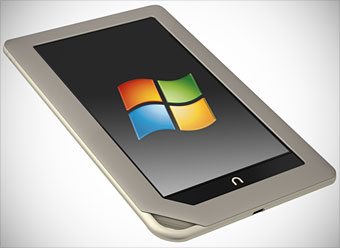 NEWS
NEWS
 NEWS
NEWS
 NEWS
NEWS
![]() Reports today have surfaced saying that Microsoft’s looking to splurge a billion readies on Barnes & Noble’s Nook Media business. The report, which came from the website TechCrunch, was based on leaked internal documents that were later confirmed as being genuine by the New York Times. What’s more, the documents also disclose the fact that Barnes & Noble is intent on discontinuing its line of Nook tablets next year, though it plans to continue with its dedicated e-readers for the time being.Can The Surface Cut It As An E-Reader?
Reports today have surfaced saying that Microsoft’s looking to splurge a billion readies on Barnes & Noble’s Nook Media business. The report, which came from the website TechCrunch, was based on leaked internal documents that were later confirmed as being genuine by the New York Times. What’s more, the documents also disclose the fact that Barnes & Noble is intent on discontinuing its line of Nook tablets next year, though it plans to continue with its dedicated e-readers for the time being.Can The Surface Cut It As An E-Reader?
The acquisition is an interesting one. At a first glance, the move makes sense for a number of reasons, but when you look closer at the business there’s also plenty of evidence to suggest that Microsoft could be wasting its money. So what does Microsoft want out of Nook?
Staring us in the face is Microsoft’s glaring lack of any decent kind of reading eco-system for its Surface tablets. It’s no secret that Redmond is looking for an entery into the e-reading business – thats’ why it bought a stake in Nook to begin with, but until now the only thing it has to show for that investment is one measly Nook app in the Windows Store. By taking full control of Nook’s underlying technology, Microsoft will be able to utilize some of the best aspects of the Nook, sch as its Scrapbooking and Book Discovery features. In addition, the deal would also give Microsoft access to Nook’s catalog of e-publishers, which are owned by Nook Media rather than Barnes & Noble.
The other glaring problem for Microsoft is its total lack of a user base at present. It’s got a lot of catching up to do after all – Amazon’s Kindle is by far and away the leading e-reader platform, and Apple has a somewhat sizeable share as well. Microsoft’s chances of catching up aren’t good, but obviously its prospects would be a lot better by taking over an existing customer base and platform and making this accessible to Windows 8 users, rather than trying to build its own platform from nothing.
Notably, one of the difficulties with this strategy is that Nook hasn’t managed to make any inroads against Amazon for the last couple of years. By 2011 it managed to capture about a 25% market share, and since then, not a lot more. Even so, its still a much better starting point than the zero percent share that Microsoft is starting out with.
One of the problems that Microsoft will need to overcome is the lack of a dedicated e-reading platform. Without the Nook hardware, it may struggle to sell anything at all. As Jeremy Greenfield at Forbes points out, there’s a direct correlation between e-book sales and device ownership, which he puts down to the devices being a “natural conduit” through which people can buy, organize and read their ebooks.
It’s not clear if people would be happy to do their reading on a clunky Windows 8 device (sadly, that’s what they are). Simply put, Amazon’s Kindle offers a much better reading experience – its been designed and tweaked over the years specifically for that purpose don’t forget, whereas Microsoft’s devices are intended to be productivity tools first and foremost.
Then again, maybe Microsoft is intended to build its own Windows 8-based e-reader based on the new Bay Trail atom chips? If so, that would bring about new problems to deal with – namely selling the damn things. Don’t forget that Microsoft’s Surface sales have been pretty lame of late, so there’s no real reason to suspect a e-reader would do a whole lot better. Bear in mind that Nook too, has also been struggling with sales of late, one reason being that it lacks the exclusive content that Amazon and Apple have.
Support our open free content by sharing and engaging with our content and community.
Where Technology Leaders Connect, Share Intelligence & Create Opportunities
SiliconANGLE Media is a recognized leader in digital media innovation serving innovative audiences and brands, bringing together cutting-edge technology, influential content, strategic insights and real-time audience engagement. As the parent company of SiliconANGLE, theCUBE Network, theCUBE Research, CUBE365, theCUBE AI and theCUBE SuperStudios — such as those established in Silicon Valley and the New York Stock Exchange (NYSE) — SiliconANGLE Media operates at the intersection of media, technology, and AI. .
Founded by tech visionaries John Furrier and Dave Vellante, SiliconANGLE Media has built a powerful ecosystem of industry-leading digital media brands, with a reach of 15+ million elite tech professionals. The company’s new, proprietary theCUBE AI Video cloud is breaking ground in audience interaction, leveraging theCUBEai.com neural network to help technology companies make data-driven decisions and stay at the forefront of industry conversations.